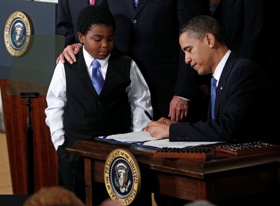After more than a year of contentious, sometimes vitriolic debate and political maneuvering, Congress succeeded in delivering an approved health care reform bill to the desk of President Barack Obama. Though the drama is far from over—debate regarding the House reconciliation package designed to expand the newly-minted law, threats of legislative repeal of the law and anger among many American voters will likely continue in the months to come—President Obama and our elected representatives have ratified a shield for millions of Americans, including many living with HIV, against the economic whims of the health insurance industry that have translated into life-and-death scenarios for many people.
With the signing of the bill on Tuesday, President Obama affirmed health insurance as a right of every U.S. citizen. Indeed, the health care reform bill is the most significant expansion of federal health care oversight since Medicare was first enacted in 1965 and is the first piece of major social legislation to have been passed in decades.
 |
| REUTERS/Jim Young |
The benefits of health care reform to people living with HIV are numerous. Insurance providers will no longer be able to discriminate against us—deny us coverage or charge us higher premiums—because we are living with HIV. Tax credits will be given to small- and medium-sized business to help provide HIV-positive employees with health insurance. A reduction (but not elimination) of the Medicare "donut hole" gap in prescription drug coverage. Community health clinics will be able to increase their services. And new health insurance options will be created for those of us with no or limited coverage.
Sadly, the bill lacked a strong public insurance option, which, according to numerous polls, was viewed favorably by the American public. The legislation also failed to incorporate the Early Treatment for HIV Act (ETHA), which would have extended Medicaid to all low-income people living with HIV, whether or not they have been classified as "disabled" in association with an AIDS diagnosis. And the final bill’s reproductive rights restrictions, an eleventh hour gambit to rally Democratic support, were awful.
Yet despite these shortcomings, we are officially on a course to universal health care in the United States. I for one will sleep better knowing I can soon eliminate insurance discrimination from my list of fears and take solace in the fact that I am not one step away from financial ruin because I have HIV.
.






Comments
Comments